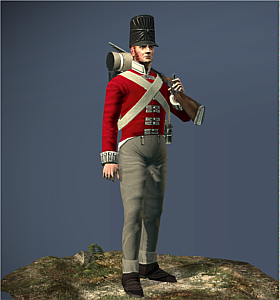Difference between revisions of "Fencibles (NTW Unit)"
| Line 13: | Line 13: | ||
==Overview== | ==Overview== | ||
These men are the soldiers of the Homefront. They were kept from the front line battles, their job was to enforce the law back home. | These men are the soldiers of the Homefront. They were kept from the front line battles, their job was to enforce the law back home. | ||
| − | Fencibles had very limited training and could not be expected to hold the line of battle like other Line Infantry units could. As a result of this, whenever they do find themselves in a battle they run away at the first sight of danger! | + | Fencibles had very limited training and could not be expected to hold the line of battle like other Line Infantry units could. As a result of this, whenever they do find themselves in a battle they run away at the first sight of danger! Despite their numerous flaws fencibles are very efficient at maintaining public order and are the cheapest unit in the game, making them effective cannon fodder. |
| + | |||
| + | Historically, Millitia regiments were regarded as second class by the rest of the army. They recieved less benefits the regular army and the officers were known to be amateurish compared with regular army officers. They were proud of their status and thought themselves better then they actually were. During the Napoleonic wars, many citizens volunteered for the Fencibles due to a sense of patriotism. In 1805, when Britain was threatened with a French invasion force, the Fencibles prepared defenses to protect the British isles. While they werent very effective, they gave Britain some protection. | ||
| + | |||
| + | ==Factions== | ||
| + | *[[Image:uk.png|25px]] [[Great Britain (NTW Faction)|Great Britain]] | ||
| + | |||
| + | [[Category:NTW Unit]] | ||
Revision as of 02:31, 4 May 2011
Overview
These men are the soldiers of the Homefront. They were kept from the front line battles, their job was to enforce the law back home. Fencibles had very limited training and could not be expected to hold the line of battle like other Line Infantry units could. As a result of this, whenever they do find themselves in a battle they run away at the first sight of danger! Despite their numerous flaws fencibles are very efficient at maintaining public order and are the cheapest unit in the game, making them effective cannon fodder.
Historically, Millitia regiments were regarded as second class by the rest of the army. They recieved less benefits the regular army and the officers were known to be amateurish compared with regular army officers. They were proud of their status and thought themselves better then they actually were. During the Napoleonic wars, many citizens volunteered for the Fencibles due to a sense of patriotism. In 1805, when Britain was threatened with a French invasion force, the Fencibles prepared defenses to protect the British isles. While they werent very effective, they gave Britain some protection.
